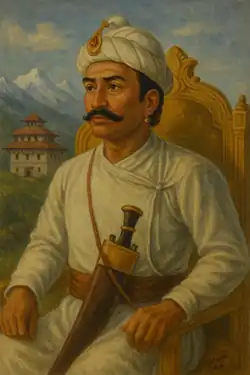Narahari Shah
| Narahari Shah | |
|---|---|
| King of Lamjung | |
 | |
| Reign | 16th century (estimated) |
| Predecessor | Position established |
| Successor | Chuda Shah |
| Dynasty | Shah dynasty |
| Father | Yasho Brahma Shah |
| Religion | Hinduism |
Narahari Shah (नरहरि शाह) was a 16th-century ruler of the hill kingdom of Lamjung in present-day central Nepal. He was the eldest son of Yasho Brahma Shah, the King of both Kaski and Lamjung. Narahari Shah is regarded as an early figure in the Shah dynasty lineage that eventually unified Nepal under his nephew, Prithvi Narayan Shah.
Background
Narahari Shah belonged to the Shah royal family that ruled over several small principalities in mid-western Nepal. After the division of Yasho Brahma Shah territories:
- Narahari Shah ruled Lamjung,
- One of his brothers ruled Kaski, and
- His youngest brother, Dravya Shah, founded the Gorkha Kingdom in 1559.[1][2]
Role in History
Historical accounts note that Narahari Shah remained as ruler of Lamjung while his brother advanced into Gorkha. He maintained ties with Gorkhali courtiers and reportedly contested Dravya Shah's expansion, leading to intermittent tension. Their mother later mediated a boundary settlement at the Chepe River, separating Lamjung and Gorkha.[3][4][5]
Legacy
Narahari Shah's rule helped sustain the Shah dynasty’s regional influence. His branch of the family provided a stable foundation for the eventual rise of Gorkha and the later unification of Nepal.[6] Narahari Shah’s tenure represents the consolidation of Shah dynasty power in Lamjung. While his younger brother’s conquest expanded their influence into Gorkha, Narahari’s lineage preserved regional autonomy. His rule helped set the stage for later unification under the Shah monarchy.
See also
References
- ^ Pokhrel, Aupson (2023-04-08). "King Drabya Shah - An Encyclopedia of Nepali History". Retrieved 2025-07-08.
- ^ "CoAS Thapa unveils statute of 16th-century monarch Yasho Brahma Shah". himalayantimes. 2018-10-14. Retrieved 2025-07-08.
- ^ Pokhrel, Aupson (2023-04-23). "Rise and Origin of Shah Dynasty - An Encyclopedia of Nepali History". Retrieved 2025-07-08.
- ^ Bhusal, Suresh (2020-07-15). "Introduction to Shah Dynasty". चिनारी नेपाल. Retrieved 2025-07-08.
- ^ Regmi, D. R. (1952). Ancient and medieval Nepal.
- ^ Karn, Vashu. "Chapter 6: Shah Period". Resource Sansaar. Retrieved 2025-07-08.